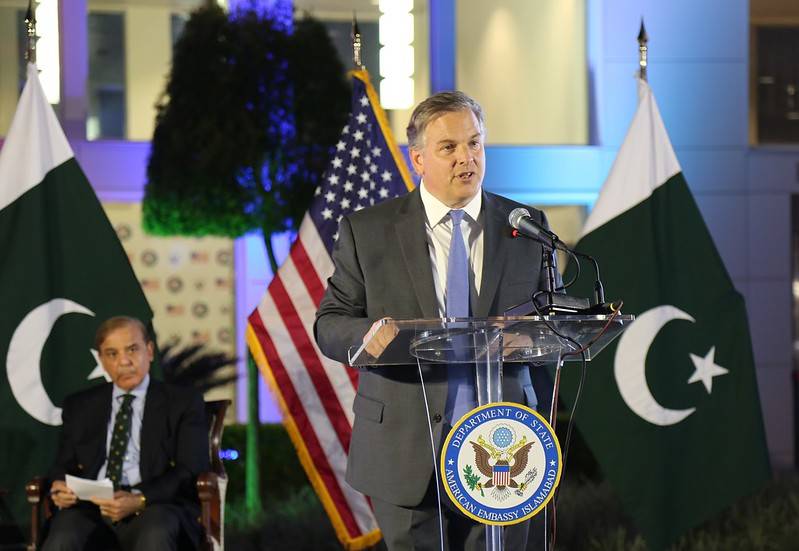
In the unfolding saga of Pakistan's political theater, US Ambassador Donald Blome emerges as a central figure - delicately walking a tightrope, meticulously balancing the pursuit of democratic ideals with the imperative of securing American strategic interests in what is likely to be a tumultuous post-election scenario.
Blome's foray into the labyrinth of Pakistani politics has triggered a political firestorm, marked by engagements with key players such as the Muslim League-N, People's Party, and the Istehkam-e-Pakistan Party. While these endeavors are presented as a commitment to fostering fair and transparent elections, the glaring omission of discussions with Tehreek-e-Insaaf, a party vocal about American interference, adds layers of complexity to the evolving narrative.
As the US envoy pledges unwavering support for the Election Commission of Pakistan's quest for transparent elections, the ground reality presents a contradictory tableau. The incarceration of pivotal political figures and allegations of an uneven playing field raise poignant questions about the credibility of the electoral process. The overarching query resonates: how does Blome reconcile the pursuit of transparent elections with the imperative of ushering in a friendly regime post-election?
Blome's active engagement strategy unveils a nuanced approach, aligning with parties poised to wield influence in the post-election landscape. The absence of Tehreek-e-Insaaf from these dialogues, however, casts shadows of suspicion, complicating Blome's diplomatic trajectory. Accusations of American involvement in orchestrating the party's removal from power paint a narrative of diplomatic intrigue and underscore the intricacies of maintaining relations amid contentious allegations.
The diplomatic landscape becomes even more intricate against the backdrop of widespread dissatisfaction with the preliminary delimitation process. Petitions flood the Election Commission, accusing gerrymandering and violating guiding principles. Blome's vocal support for transparent elections faces a litmus test as the democratic underpinning of the process is challenged on the grounds of fairness and adherence to guiding principles.
Amidst this complex tapestry, the Sino-US competition adds layers of complexity to Blome's mission. As the US navigates the landscape to secure allies in Pakistan's democratic corridors, the imperative to prioritize strategic interests over purely democratic considerations becomes apparent. The strategic milieu amplifies the stakes, and Blome finds himself in a diplomatic maze where every step is shadowed by geopolitical complexities.
The reality of elite capture in Pakistan further complicates Blome's odyssey. Acknowledging the sway of influential figures, the US envoy faces the pragmatic dilemma of working with these actors, even at the cost of overlooking democratic shortcomings. The pursuit of a favorable regime post-election necessitates compromises, echoing the age-old adage that in diplomacy, pragmatism often overshadows idealism.
Blome, in his quest for fair elections, grapples with challenges of elite capture, accusations, and the intricate dance of geopolitics. As the US envoy walks a tightrope through the labyrinth of Pakistani politics, the post-election scenario looms large, presenting a litmus test for whether this delicate balance will culminate in a friendly regime aligned with American interests or add another layer of complexity to the paradox of transparent polls.
In this diplomatic ballet, the stakes are monumental, and the fate of Pakistan's political stability teeters on the tightrope that Blome, with diplomatic finesse, continues to navigate. The unfolding chapters of this saga promise revelations that will resonate far beyond the borders of Pakistan, offering insights into the intricate interplay between democracy, strategic interests, and the delicate art of diplomatic tightrope walking.

